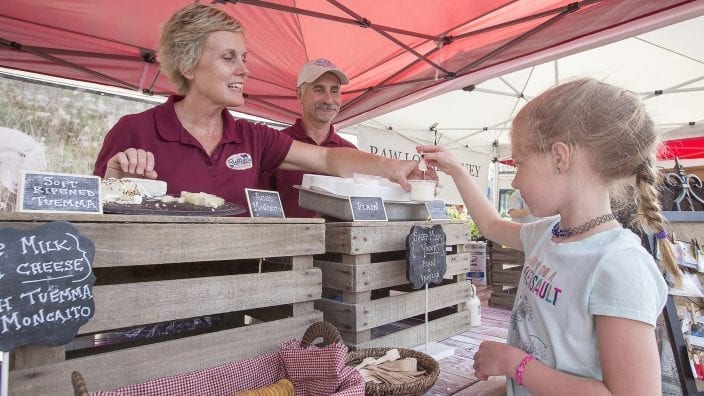Farmer’s Guide to Trucking Regulations available to Ohio Farm Bureau members
The guide includes a farm driver checklist, overview of state and federal regulations and exemptions, CDL qualifications and more.
Read More
In this Legal with Leah, Ty Higgins, Ohio Farm Bureau’s director of media relations, visits with Ohio Farm Bureau Policy Counsel Leah Curtis about the reasons for Ohio’s tax hike on gas, how those funds will be used and how the new gas tax compares to other states in the region.
Listen to Legal with Leah, a podcast featuring Ohio Farm Bureau’s Policy Counsel Leah Curtis discussing topics impacting farmers and landowners.
Ty Higgins: Earlier this year, Ohio’s gas tax increased to 38.5 cents per gallon for gasoline, 47 cents a gallon on diesel fuel. That’s a 10.5% and a 19% increase, respectively. For today’s Legal with Leah, we’re covering the reason for the tax hike on gas — how those funds will be used and how those numbers compare to other states in the region. I’m Ty Higgins joined by Leah Curtis, Ohio Farm Bureau policy counsel, and Leah we have heard a lot about America’s crumbling infrastructure and that was the main driver, no pun intended, for Governor DeWine to to seek this higher gas hike.
Leah Curtis: So in 2017 the American Society of Civil Engineers found that 17% of Ohio’s roads were in poor condition and 7% of our bridges were structurally deficient. So they estimate that the cost of driving on roads like this in need of repair actually costs the average Ohioan about $475 per year. So a pretty big price tag that you’re not directly paying but you’re paying it in car maintenance and you know problems with traffic and congestion and all that kind of thing.
Ty Higgins: There’s very little wiggle room as to where monies raised from this gas tax will go. In fact it’s part of the state’s constitution.
Leah Curtis: So this is something that I think a lot of people don’t totally know, is that they think …they see that gas tax and just think ‘Oh they’re just raising taxes. It’s just gonna go for whatever.’ Actually any fees that come from registration, operation or use of vehicles including those fuels for those vehicles, they have to be used for highway obligations, construction maintenance, repair of public highways and bridges and that’s in our constitution and the Supreme Court has upheld this in multiple cases including when we had the Commercial Activities Tax which was collected from all businesses including fueling stations and motor fuel that was sold by retailers. The Supreme Court later said you can’t collect that Commercial Activities Tax from those fuel retailers unless you’re putting it only to roads and bridges and construction and maintenance. So we now have what’s called the Petroleum Activities Tax which is different and goes into that fund for roads and bridges and maintenance.
Ty Higgins: Of course any increase is going to sound high to the average consumer. But how do these new gas tax rates compare to our neighboring states?
Leah Curtis: In comparison we’re pretty similar actually and we’re actually a little bit lower than some of our neighbors. Pennsylvania is at 58.7 cents. Michigan’s at 44.1 cents, Indiana at 42.9. We have two states neighboring that are less than us now that we’ve had the increase. West Virginia is at 35.7 so pretty close to us on our gasoline. And then Kentucky is at 26 cents.
Ty Higgins: We hear mostly about regular fuel and about diesel, but other fuel sources, they didn’t dodge this tax either.
Leah Curtis: No. So this tax is also going to also apply to compressed natural gas vehicles. So that’s kind of a new fuel option that’s out there on the market. And then the transportation budget where this was included also created new fees for hybrid and electric cars. So $100 for hybrid. $200 for electric cars. That will help to kind of level out that playing field of those cars not spending as much on the gas but still using the roads and causing wear and tear on the roads.
Ty Higgins: This is pretty controversial. Any tax increase will be. You’ll have proponents and opponents of course, but one of the biggest issues that came out of a lot of these talks was that front license plate on vehicles. Some states have done away with it. Ohio of course has talked about it for a while and maybe have gotten a little closer to that solution. Where does that stand and how does Farm Bureau feel about it?
Leah Curtis: What happened in the transportation budget was that after 2020 there would be no need for a front license plate. But there is going to be a study committee done to look at that issue. Some of the questions around it are lots of new cars have lots of technology in their front bumper. So that causes a problem. But on the other hand that front license plate does help with law enforcement and with you know looking for vehicles and their enforcement obligations. So there are some pros and cons to it. So the study will be happening over the next year. Farm Bureau does have policy that supports keeping the front license plate, but that was the decision that was ended up in the transportation budget was to eliminate it. Now we’ll see what this study committee comes out with. They may come out with you know, new options or other things that would maybe not have the problem with the technology in the cars but also allow for that enforcement perk as well.


The guide includes a farm driver checklist, overview of state and federal regulations and exemptions, CDL qualifications and more.
Read More


The emergency fuel waiver to allow the sale of summer gasoline blends containing 15% ethanol will lengthen the period during which Americans can continue buying E15 from June 1 to Sept. 15.
Read More

The Small-Scale Food Business Guide covers federal and state regulations for selling food products such as raw meat, dairy, eggs, baked goods, cottage foods, fruits and vegetables, honey and more.
Read More

New resources and technology are broadening the different types of sales tools and strategies available to farmers.
Read More

ODA will enroll 500,000 acres into the program for a two-week sign-up period, beginning April 22, 2024, through May 6, 2024. Contact local SWCD offices to apply.
Read More

Katie Share of Columbus has been named ExploreAg and Youth Development Specialist for Ohio Farm Bureau.
Read More

Mary Klopfenstein of Delphos has been named Young Ag Professional and Ag Literacy Program Specialist for Ohio Farm Bureau.
Read More

The plan has been updated to give sole proprietors access to more rate stability and a smart solution that offers potential savings on health care.
Read More

The American Farm Bureau Federation, in partnership with Farm Credit, is seeking entrepreneurs to apply online by June 15 for the 2025 Farm Bureau Ag Innovation Challenge.
Read More

Adele Flynn of Wellington has been elected treasurer of the Ohio Farm Bureau Federation and now holds the third highest elected office in Ohio’s largest and most influential farm organization.
Read More